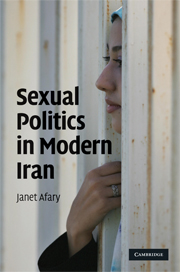Book contents
- Frontmatter
- Contents
- List of illustrations
- Acknowledgments
- Map of Iran
- Introduction
- Part 1 Premodern practices
- Part 2 Toward a Westernized modernity
- 4 On the road to an ethos of monogamous, heterosexual marriage
- 5 Redefining purity, unveiling bodies, and shifting desires
- 6 Imperialist politics, romantic love, and the impasse over women's suffrage
- 7 Suffrage, marriage reforms, and the threat of female sexuality
- 8 The rise of leftist guerrilla organizations and Islamist movements
- Part 3 Forging an Islamist modernity and beyond
- Conclusion: Toward a new Muslim-Iranian sexuality for the twenty-first century
- Glossary
- Bibliography
- Index
8 - The rise of leftist guerrilla organizations and Islamist movements
Published online by Cambridge University Press: 05 June 2014
- Frontmatter
- Contents
- List of illustrations
- Acknowledgments
- Map of Iran
- Introduction
- Part 1 Premodern practices
- Part 2 Toward a Westernized modernity
- 4 On the road to an ethos of monogamous, heterosexual marriage
- 5 Redefining purity, unveiling bodies, and shifting desires
- 6 Imperialist politics, romantic love, and the impasse over women's suffrage
- 7 Suffrage, marriage reforms, and the threat of female sexuality
- 8 The rise of leftist guerrilla organizations and Islamist movements
- Part 3 Forging an Islamist modernity and beyond
- Conclusion: Toward a new Muslim-Iranian sexuality for the twenty-first century
- Glossary
- Bibliography
- Index
Summary
The dramatic changes discussed in the last chapter resulted in a backlash that led to an unusual alliance between leftists opposed to imperialism and consumerism, and conservative Islamists who were also hostile to Western culture. During the 1960s and 1970s some degree of convergence appeared in the writings of leading Islamist clerics Ayatollah Khomeini, Ayatollah Morteza Motahhari, and Ayatollah Mahmoud Taleqani, and the lay Islamist thinkers Jalal Al-e Ahmad and Ali Shariati, on the one hand, and secular leftist intellectuals on the other. Despite their numerous ideological differences, they shared, among other things, an overt enmity toward aspects of modern gender norms, particularly second-wave feminism. Such resentment was not limited to men, but could also be found among (1) a new generation of female college students who joined underground leftist organizations; (2) less educated Islamist women who entered the clandestine circles of Ayatollah Khomeini's supporters; and (3) women from old and new middle-class families who supported Ali Shariati and his modern oppositional religious center, the Husseiniyeh Ershad. In their personal lives, these women tried to combine new political objectives and the benefits of a modern lifestyle with older ethical and moral sensibilities.
In the course of the 1978–1979 revolution, many leftist and even women's publications encouraged their readers to accept Khomeini's leadership. This kind of support was facilitated by the fact that Khomeini's various pronouncements articulated a vision of a “third way” that would avoid the evils of (1) Western imperialism, which turned women into sexual commodities, and (2) Soviet communism, which destroyed family values.
- Type
- Chapter
- Information
- Sexual Politics in Modern Iran , pp. 234 - 262Publisher: Cambridge University PressPrint publication year: 2009



